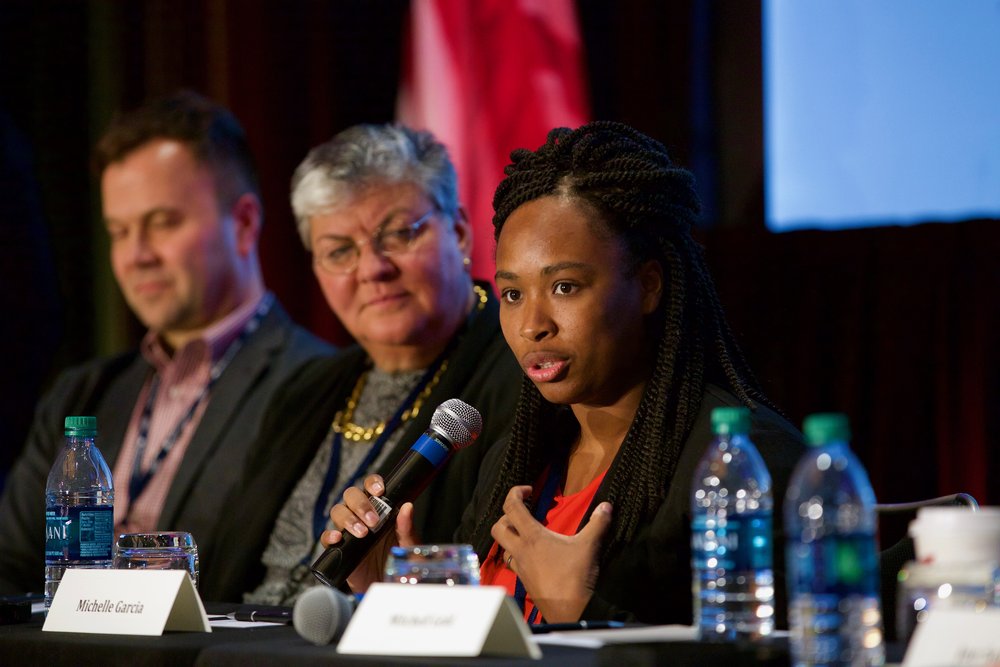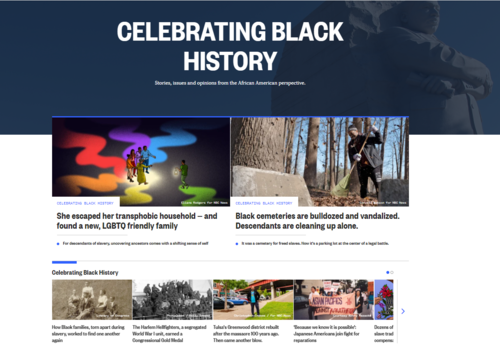NBC BLK Editorial Director Michelle Garcia says “news organizations need to think about how they cover people of color all year round.”

Career Spotlight
Michelle Garcia, the editorial director of the NBC BLK digital news vertical, leads coverage dedicated to elevating America’s conversation about Black identity, politics and culture and telling stories by, for and about the Black community. Garcia, who joined NBC BLK in 2020, previously served as an editor at VICE, Out, Vox, Mic and The Advocate. This conversation is edited for length and clarity.
What makes being the editor of NBC BLK special to you?
I have a very fleshed out theory about what an editor does, or at least how I see my job as an editor. One, story doctor – we’re there to assign and take stories, and shape them to be the absolute best they can be. As a manager, I try to coach people through the writing process, being a journalist and sometimes just being human. Being a curator is also a big part of this job. I spend a lot of my time getting emails, shaping the reporting and shaping the mix and flow of stories.
NBC BLK doesn’t have to be on every story. What we can do is slow down and say, “There’s a big theme emerging,” or, “Here’s a problem that we’re seeing.” For instance, we’ve been following bomb threats at HBCUs. We assigned a story about why is this happening, that ended up yielding a really interesting story about how HBCUs have been under target for a long time. Every time that there’s racial progress, there comes a backlash.
You cover Black issues at a time of great change in the news industry and American culture at large. What are your observations of this cultural shift?
I honestly think about this a lot. We are in a cultural moment where race and ethnicity and identity are at the core of discussions that are interesting to people. Race is something that has always been interesting to people, because a lot of people are scared to talk about it. I think that keeping the light on that is something that takes a specific skill set. It’s really important to stay on that drumbeat.
When newsrooms have coverage “months” – Black History Month, AAPI Heritage Month, Women’s History Month – reporters and producers can have trouble telling stories about marginalized communities outside of those months because editors need a “news peg.” What is a good way to break that mold?
I think that some news organizations don’t really analyze and think about the way that they cover people of color all year round. If Black Heritage Month is going to be the only time you do it – fine, but there’s still a problem. It is also an excuse for people to not care the other 11 months out of the year. If you’re a reporter and you know in your heart that “we should be telling this story right now,” then make a case for that story. These are stories that should be covered all the time.
I enjoy in a lot of ways the work that BLK has done this month. I feel like this year has been the best Black Heritage Month that I have ever led editorially, because we decided not to do a ridiculous amount of stories. We decided to treat this like we’re putting together the Black History Month issue of BLK, like a beautiful magazine. We assigned a very small number of really good stories that we would have assigned any other point in the year. I feel like I think every year from now on, that’s what I’m going to try to do.
What is your advice for journalism students and early career journalists who are interested in becoming an editor and following your footsteps?
I’m constantly watching editors around me. Read everything with a close eye, thinking about how you can make a story better. Read with a critical eye. Observe other editors, and ask them, “Hey, I saw that you changed this headline, I’m curious what that was about,” or, “Hey, I am thinking about rearranging this story, I’d love to talk to you more about why or how to do that?” Being an editor is this thing that you learn in community.
What are some favorite stories that you’ve worked on in the past year?
Curtis Bunn did a really cool story about Black retailers. We were talking about how Black people love sneakers, we collect sneakers, we invented athleisure in a lot of ways, or at least we were huge contributors to it. And we’re not part of the revenue coming from that, we’re not earning the money. Black people are trying to cultivate entrepreneurialism in the sneaker space.
We did another fantastic story, Char [Adams] went out and found a bunch of people who were hurt by police while they were protesting in 2020. This woman was talking about how she can’t pick up her child anymore, for example, and we were catching up with people a year after their injuries to talk about that.
We did the Southlake podcast, that was really fun. We’re still working on it.
I feel like 2021 was really strong for us, we’ve built a really great team. I’m incredibly proud of that.



